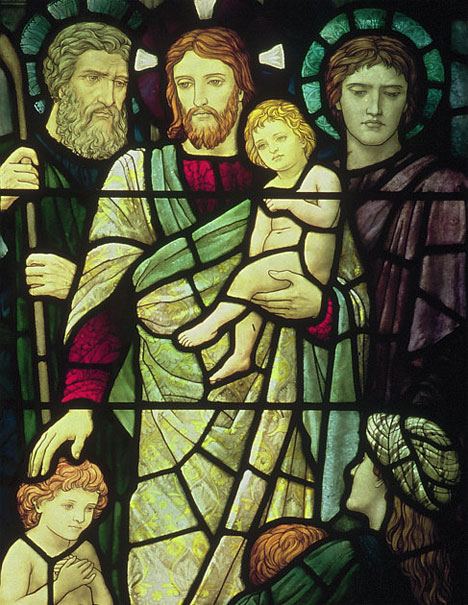Sep
12
2013

And John bore witness: “I saw the Spirit descend from heaven like a dove, and it remained upon him.” (John 1:32)
“Efficacious paedobaptism is maintained at the tragic cost of the efficacious work of the Spirit…”
Chapter 1 continued
See the Baptism links page for all articles in this series.
Dr Leithart says that the sign of baptism is not merely symbolic of a personal encounter with God, but is actually the personal encounter. I concluded, based on the process of maturity found throughout Scripture, that although his observation is correct as far as it goes, what he has observed goes even deeper. “The sign” is not merely the baptism, but actually includes the human being in personal relationship with God. The one being baptized is the sign, and the sign is ethical maturity.
Continue reading
Comments Off | tags: Abraham, Baptism, Covenant Theology, Federal Vision, Jonah, Peter Leithart | posted in Bible Matrix, Biblical Theology
Aug
20
2013
 Introduction
Introduction
Recently, I’ve been re-reading Rich Lusk’s Paedofaith: A Primer on the Mystery of Infant Salvation and a Handbook for Covenant Parents. This reading was with the intention of blogging through it and dealing with the main points, as is the helpful practice of Doug Wilson with certain books.
The problem is that Lusk makes some enormous, illogical and unbiblical assumptions in his preface and introduction, and these assumptions are based on arguments found elsewhere.
Continue reading
Comments Off | tags: Baptism, Federal Vision, Peter Leithart, Rich Lusk | posted in Biblical Theology
Jul
24
2013

Jean flipped one page back and realized he had contradicted himself once again. This was tricky stuff, working out salvation, but at least he was showing his workings. “Oh well,” he thought. “One day they will invent word processors.”
In a post called Baptism Is Not Faith, Shane Lems points out where the Federal Vision guys depart from the “historic Reformed/Presbyterian confessions.” He writes:
Continue reading
5 comments | tags: Baptism, Federal Vision, Reformers, Steve Wilkins | posted in Biblical Theology
Jun
13
2013

or “Nothing to see here, citizens. Go to your homes.”
Emeth Hesed blogged recently about “heads of households” meetings…
Since moving to the Land of the Free, I have enjoyed how well women are treated here. I can see that America really is a country with a Christian heritage even if it’s not a Christian nation anymore. But attending the church where my husband grew up, I have never felt so disenfranchised in my life. I have never felt so cut off from the covenant I was baptized into, from the rightful inheritance God has promised me.
Emeth makes some great points but the thing that strikes me about these “intramural” Presbyterian debates is the failure to identify the real villain.
Continue reading
4 comments | tags: Baptism, Covenant Theology, Ecclesiology, Federal Vision | posted in Biblical Theology
Dec
27
2012
or Shekinah People

“The solution here is not, as Calvin believed, to dress the New Covenant’s ethical maturity in the puerile clothing of paedobaptism.”
In The Failure of the American Baptist Culture [PDF], James Jordan, Ray Sutton and others expose the rot at the heart of baptistic theology, which is inherently man-centred. The authors call us from a view of salvation in isolation to a wider vision of the meaning of baptism, which signifies the broader realities of the Covenant of Grace. I learned a great deal about history and Reformed theology, and thoroughly recommend it to you. In my view, however, they don’t go far enough. A call to understand the vital historical connection between circumcision and baptism certainly deals with the errors of the Anabaptists, but when rightly understood, the progressive nature of revelation also exposes the use of paedobaptism as a connection with the Old Covenant as entirely bogus.
Continue reading
4 comments | tags: Baptism, Calvin, Covenant Creationism, Covenant Theology, Federal Vision, James Jordan, Ray Sutton, Tabernacle | posted in Bible Matrix, Biblical Theology, Ethics, Quotes, The Restoration Era
Dec
22
2012
or The Fiction of Prelapsarian Babies
“A paedobaptistic sociology is a misrepresentation of the Gospel. It conflates the cutting of Adam with the crushing of the serpent.”
The most biblical, thoughtful and consistent paedobaptists (the Federal Vision), believe that the failure of America’s baptistic culture can be remedied through a biblical application of paedobaptism. The answer to modern individualism is a coherent Christian sociology. I agree with that. What I disagree with is their insistence on a Covenant sociology that was made redundant at Pentecost.
Continue reading
4 comments | tags: Abraham, AD70, Baptism, Federal Vision, Peter Leithart | posted in Biblical Theology, The Last Days
Nov
18
2012
or Mixed Blessings

Doug Wilson sees evidence for the classification of “Covenant children” in 1 Corinthians 7:14.
“For the unbelieving husband is sanctified by the wife, and the unbelieving wife is sanctified by the husband: else were your children unclean; but now are they holy” (1 Cor. 7:14).
The Corinthians had wanted to know whether unbelief on the part of a spouse was in itself grounds for divorce. Paul has replied no, provided that the unbelieving partner is pleased to be together with the Christian in a marriage as biblically defined. If the only thing that is wrong is the spouse’s failure to believe in Christ, then the couple should still remain together.
Continue reading
Comments Off | tags: Baptism, Corinthians, Doug Wilson, Federal Vision, Hermeneutics, Mark Horne, Matthew Colvin | posted in Biblical Theology, Quotes
Nov
9
2012
or The Federal Vision’s Adam and Steve

Pushing something to its logical conclusions is most often a wise thing to do. If you have good data to start with (unlike those pushing global warming) the resulting “computer model” can be very helpful. This is also the case with biblical doctrine. It is very helpful to push hyperpreterism to its logical conclusions, which damn it entirely. It is also very helpful to push biblical typology to its logical conclusions. This may sound harebrained to some, but if done within the constraints the Bible itself gives us, false doctrine should stand out like blood stains under ultraviolet light.
Continue reading
Comments Off | tags: Baptism, Circumcision, Covenant Theology, Federal Vision, Postmillennialism | posted in Bible Matrix, Biblical Theology, Ethics
Sep
17
2012

“What we have received from Jesus is not a collection of ‘merits,’ but rather His maturity.”
James B. Jordan writes:
The problem with the “covenant of works” notion lies in the fact that it is linked up with merit theology. There is no merit theology in the Bible. Merit theology is a hangover of medieval Roman Catholicism.
Continue reading
7 comments | tags: Covenant Theology, Federal Vision, Genesis, James B. Jordan, Melchizedek, Roman, Roman Catholicism | posted in Biblical Theology, Christian Life, Quotes
Aug
9
2012

“Let the children
…..come to me,
……….and do not hinder them,
…..for to such belongs
the kingdom of God.”
(Luke 15:16)
Jesus is often pictured with a child or children. His love for children is used as evidence for infant baptism. After all, aren’t we bringing our infants to Jesus in paedobaptism and paedocommunion?
Continue reading
7 comments | tags: Baptism, Communion, Federal Vision, High Priest | posted in Bible Matrix, Biblical Theology


































